《行动导向教学法理论基础》中英文翻译
行动导向教学法在英语教学中的运用

行动导向教学法在英语教学中的运用引言随着社会的发展和进步,教育也在不断更新和改革。
一种被广泛运用的教学法就是行动导向教学法。
它是一种以行动为中心的教学方法,通过让学生参与实际的活动和实践来学习知识和技能。
行动导向教学法在英语教学中的应用已经得到广泛的认可和应用。
本文将讨论行动导向教学法在英语教学中的运用,并探讨其对学生学习成效的影响。
一、行动导向教学法的基本原理行动导向教学法是一种以学生的实际行动为中心的教学方法,其基本原理包括以下几点:1. 学生参与:行动导向教学法强调学生的主动参与,学生通过亲身实践来学习知识和技能。
3. 目标導向:行动导向教学法以学习目标为导向,教师根据学生的实际情况设定具体的学习目标,帮助学生实现目标。
4. 反馈和调整:行动导向教学法注重学生的反馈和调整,通过实践活动和反馈来帮助学生不断改进和提高。
在英语教学中,行动导向教学法具有明显的优势和适用性。
它能够有效地激发学生学习的兴趣,培养学生的实际运用能力,并提高学生的学习效果。
具体来说,行动导向教学法在英语教学中的运用体现在以下几个方面:1.课堂实践:通过组织语言实践活动,如角色扮演、小组讨论等,帮助学生运用所学知识,提高语言表达能力和沟通能力。
2.项目学习:通过设计项目学习任务,让学生主动参与并完成英语项目,如制作英语海报、编写英语剧本等,培养学生的团队合作能力和实际应用能力。
3.任务驱动:通过设计任务驱动的学习活动,让学生通过实际任务来学习英语知识,如完成英语口语演讲、参加英语辩论赛等,提高学生的学习积极性和学习效果。
4.实际应用:通过引入真实的语言环境和情境,帮助学生在实际生活中应用所学的英语知识,如参观英语国家、实践交流等,提高学生的实际应用能力。
三、行动导向教学法对学生学习效果的影响行动导向教学法在英语教学中的应用,对学生的学习效果有着积极的影响。
行动导向教学法能够激发学生学习的兴趣,使学习变得更加生动有趣。
学生通过实际活动的参与,可以感受到学习的乐趣,激发学习的动力,提高学习的积极性,从而更好地掌握英语知识和技能。
行动导向教学法在英语教学中的运用
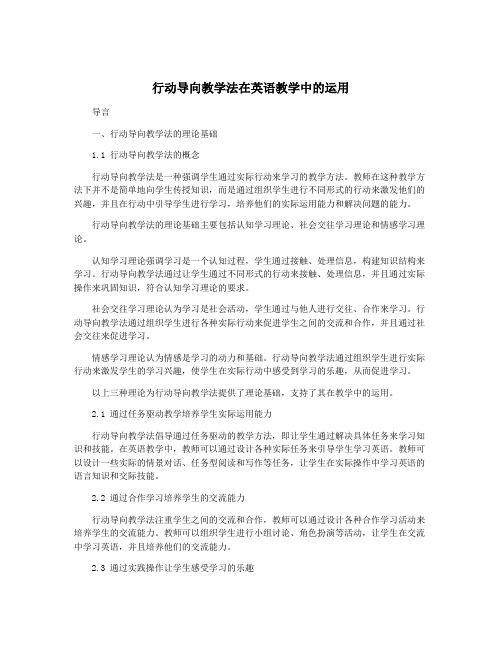
行动导向教学法在英语教学中的运用导言一、行动导向教学法的理论基础1.1 行动导向教学法的概念行动导向教学法是一种强调学生通过实际行动来学习的教学方法。
教师在这种教学方法下并不是简单地向学生传授知识,而是通过组织学生进行不同形式的行动来激发他们的兴趣,并且在行动中引导学生进行学习,培养他们的实际运用能力和解决问题的能力。
行动导向教学法的理论基础主要包括认知学习理论、社会交往学习理论和情感学习理论。
认知学习理论强调学习是一个认知过程,学生通过接触、处理信息,构建知识结构来学习。
行动导向教学法通过让学生通过不同形式的行动来接触、处理信息,并且通过实际操作来巩固知识,符合认知学习理论的要求。
社会交往学习理论认为学习是社会活动,学生通过与他人进行交往、合作来学习。
行动导向教学法通过组织学生进行各种实际行动来促进学生之间的交流和合作,并且通过社会交往来促进学习。
情感学习理论认为情感是学习的动力和基础。
行动导向教学法通过组织学生进行实际行动来激发学生的学习兴趣,使学生在实际行动中感受到学习的乐趣,从而促进学习。
以上三种理论为行动导向教学法提供了理论基础,支持了其在教学中的运用。
2.1 通过任务驱动教学培养学生实际运用能力行动导向教学法倡导通过任务驱动的教学方法,即让学生通过解决具体任务来学习知识和技能。
在英语教学中,教师可以通过设计各种实际任务来引导学生学习英语。
教师可以设计一些实际的情景对话、任务型阅读和写作等任务,让学生在实际操作中学习英语的语言知识和交际技能。
2.2 通过合作学习培养学生的交流能力行动导向教学法注重学生之间的交流和合作,教师可以通过设计各种合作学习活动来培养学生的交流能力。
教师可以组织学生进行小组讨论、角色扮演等活动,让学生在交流中学习英语,并且培养他们的交流能力。
2.3 通过实践操作让学生感受学习的乐趣行动导向教学法倡导让学生通过实际应用来学习,培养他们的解决问题能力。
在英语教学中,教师可以通过各种实际应用场景来引导学生学习,并且培养他们的解决问题能力。
行动导向教学

行动导向教学“行动导向教学”(Action-Oriented Instruction)是一种按照学生的行为和个性进行教学的方法。
它的基本设计是将学习经验与学生的主动性相结合。
它以学生的自主学习行为为基础,研究和采用灵活的学习环境,旨在激发学习的兴趣,促进工作效率,改善学习效果,发挥学生“出色”的发展潜能。
行动导向教学由活动组成,旨在提高学生动手能力、理解能力和实际应用能力。
此外,信息技术实用性进一步改善了学习环境。
从面向行动的学习环境中,学生可以通过实践来理解知识,培养社会技能,发展创造力,提高自学能力,激发更多的学习和主动性。
尽管行动导向教学有很多不同的部分,但主要是利用各种实践活动,将理论学习结合实际应用。
活动教学旨在激发学习者的学习兴趣,并运用它们来理解和掌握学习内容。
例如,一些活动形式,如实践分析、小组讨论、演示说明等,都具有此类有效性。
此外,任务和游戏也是常用的活动形式,可以帮助学生开发和促进学习行为的产生和维持,从而掌握学习概念。
行动导向教学的实施,需要老师在教学过程中学会实时评价学生,以便及时调整教学活动的内容和方式。
同时,学生必须建立充足的自学能力,提高其在教学过程中主动发挥的能力。
最后,学校也需要建立一个良好的学习环境,以支持行动导向教学的实施。
一方面,行动导向教学强调主动性学习,促进学生利用不同的方法自行学习,掌握学习内容。
另一方面,它注重学习经验和实践,通过贴近实际的活动形式,让学生以较高的效率和效果实现学习目标。
总的来说,行动导向教学能够促进学生的技能开发,激发更多的兴趣,拓宽动手思考能力,从而更好地掌握知识和社会实践能力,发展个性。
行动导向教学法在护理专业英语教学中的应用实践

行动导向教学法在护理专业英语教学中的应用实践作者:段艳丹来源:《科教导刊》2021年第03期摘要行动导向教学法是源自德国的一种先进教学理念,注重核心关键能力的培养。
文章介绍了行动导向教学法在护理专业英语教学中的应用实践,通过项目教学法、任务驱动法、小组合作法等教学方法,有效地提高了学生们的学习兴趣及成效,为行动导向教学法在专门用途英语教学中的应用提供了参考。
关键词行动导向护理专业英语专门用途英语中图分类号:G424 文献标识码:A DOI:10.16400/ki.kjdkx.2021.01.053Abstract Action-oriented teaching is an advanced teaching idea from Germany, which pays attention to the cultivation of key competency. This article introduces the application of action-oriented teaching in Nursing English, elaborates different ways to promote students' learning interest and effects, such as project-based teaching method, task-driven teaching method and group cooperative learning, and provides practical reference for the application of action-oriented teaching in English for specific purpose.Keywords action-oriented; nursing English; English for specific purposes護理专业英语属于医学英语,是专门用途英语ESP(English for Specific Purposes)的一种。
行动导向教学法的学习心得
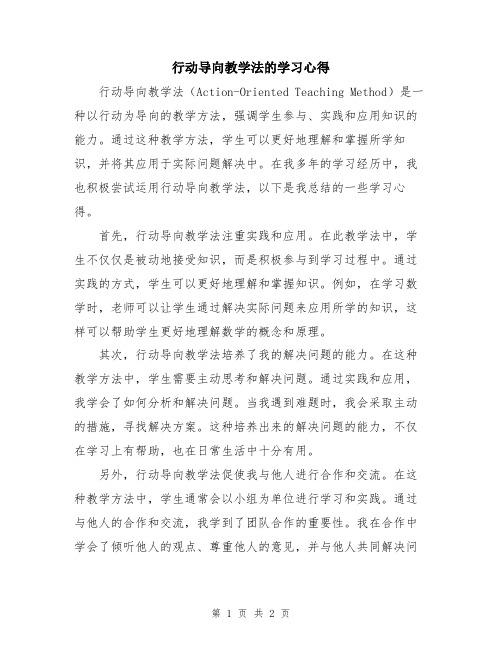
行动导向教学法的学习心得行动导向教学法(Action-Oriented Teaching Method)是一种以行动为导向的教学方法,强调学生参与、实践和应用知识的能力。
通过这种教学方法,学生可以更好地理解和掌握所学知识,并将其应用于实际问题解决中。
在我多年的学习经历中,我也积极尝试运用行动导向教学法,以下是我总结的一些学习心得。
首先,行动导向教学法注重实践和应用。
在此教学法中,学生不仅仅是被动地接受知识,而是积极参与到学习过程中。
通过实践的方式,学生可以更好地理解和掌握知识。
例如,在学习数学时,老师可以让学生通过解决实际问题来应用所学的知识,这样可以帮助学生更好地理解数学的概念和原理。
其次,行动导向教学法培养了我的解决问题的能力。
在这种教学方法中,学生需要主动思考和解决问题。
通过实践和应用,我学会了如何分析和解决问题。
当我遇到难题时,我会采取主动的措施,寻找解决方案。
这种培养出来的解决问题的能力,不仅在学习上有帮助,也在日常生活中十分有用。
另外,行动导向教学法促使我与他人进行合作和交流。
在这种教学方法中,学生通常会以小组为单位进行学习和实践。
通过与他人的合作和交流,我学到了团队合作的重要性。
我在合作中学会了倾听他人的观点、尊重他人的意见,并与他人共同解决问题。
这种合作精神和交流能力,不仅使学习更加高效,也为我今后的工作和生活打下了良好的基础。
此外,行动导向教学法提高了我的自主学习能力。
在这种教学方法中,学生需要主动参与到学习过程中,通过实践和应用来巩固和加深所学的知识。
我通过这种方式不断提高了自主学习的能力。
在学习新知识时,我会主动寻找相关的资料和资源,并尝试将其应用于实际问题中。
这种自主学习的能力,不仅使学习更加有趣和有效,也让我能够更好地适应和应对未来的挑战。
最后,行动导向教学法培养了我的实践能力。
在这种教学方法中,学生需要通过实践和应用来巩固和加深所学的知识。
通过实践和应用,我学会了将理论知识应用于实际问题解决中。
行动导向教学法在中职计算机基础教学中的应用

行动导向教学法在中职计算机基础教学中的应用随着信息技术的不断发展,计算机已成为现代社会必不可少的工具。
因此,在中等职业教育中,计算机基础教学显得尤为重要。
行动导向教学法是一种以实践为导向的教学方法,在计算机基础教学中应用广泛。
下面,本文将介绍行动导向教学法在中职计算机基础教学中的应用。
一、行动导向教学法的概述行动导向教学法(Action-Oriented Approach)是一种注重学生实践和行动的教学方法。
相对于传统的知识传授,行动导向教学法更注重学生的实践能力和解决问题的能力,从而提高学生的学习效果。
行动导向教学法不仅强调知识本身的重要性,更强调掌握知识的应用能力。
它适用于培养学生在实践中学习、发现问题、解决问题的能力,尤其适用于学科知识较为抽象和难以理解的领域。
(一)课程安排在中职计算机基础教学中,行动导向教学法可以通过实践课程和项目实践来实现。
在实践课程中,学生可以接触和使用计算机软硬件,并进行实验操作和模拟操作。
在项目实践中,学生可以通过DIY计算机等设备完成项目设计,提高对计算机硬件的理解和掌握技能。
(二)教学方法在中职计算机基础教学中,行动导向教学法的教学方法主要包括三个方面。
首先,通过问答互动的方式引导学生了解计算机硬件和软件的概念和特点。
其次,在讲解相应实验的操作方法与步骤时,采用演示和实践操作相结合的方式,示范成功的操作过程,让学生能够身临其境的操作理解。
最后,教师以问题为导向,引导学生自主思考、自主探究和自主实践,从而激发学生的学习积极性和学习兴趣。
(三)教学效果行动导向教学法在中职计算机基础教学中的应用,能够提高学生的学习效果和其对计算机硬件操作技术的技能掌握能力。
通过实践操作和DIY计算机等活动的带动,学生的实践操作能力得到了很好的提高;同时也激发了学生的自学兴趣,增强了他们的自信心和创造力。
三、总结在计算机基础教学中,行动导向教学法能够有效地提高学生的学习效果和实践能力。
1 Dr. Bünning - Vortrag 报告-行动导向教学法理论基础
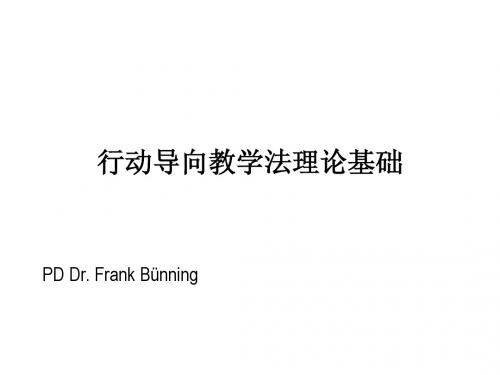
一个完整的行动包括:
1. 2. 3. 导向
执行
检验
对教育意义重大的现代化生产结构特征
1. 2. 3. 4. 5. 6. 7. 8. 以生产过程链为导向的组织形式取代了功能等级 以顾客为导向取代了以产品为导向 对生产和成本预算负责取代了分层结构的任务管理 团队及小组工作取代了单独工作 完整的工作活动取代了日常事务 自我控制取代了标准化指南 参与其中取代了由他人来决定 持续改进取代了梦想创新 (参看 弗里林, E., 1993, p.32)
下文中,我们按照相关文献中通常使用的语言习惯,把 基于行动理论基础上的教学称为行动导向教学(德语 缩写为HoU)。 1. 行动导向教学并不是一种方法,而是一种教学设计的 理念。它在组织教学过程中,符合个人和学校的条件 下,为设计的可能性提供更大的自由空间。 2. 行动导向教学中,学生是教学的中心。学生作为行动 个体,可以在很大程度上自我决定,可以积极参与到 教学过程的设计中并进行反思,可以独立自主的决定 行动目标,路径和手段。 3. 行动导向教学是以自我决定学习为主。教师在教学过 程中,由统治地位逐步后退到扮演学习伙伴的角色, 帮助学生。 4. 行动导向教学是以自我控制学习为主。
Frieling, E.: Personalentwicklung und Qualifizierung – Neue Ansätze und Probleme – In: Das lernende Unternehmen. – Hochheim, 1993
豪治(HORTSCH)提出的 基于行动理论基础上的教学的特征
基于行动理论基础上的教学的特征
9. 行动导向教学,要求在教学设计中,注意人类行动的基本结构: 1. 以执行学习行动为导向-分析问题,确定目标,获取信息,计划行动, 进行决策 2. 执行行动 3. 检测和评价行动结果,对做法进行反思 10. 行动导向教学首先是根据学习的内在逻辑而产生的,其次是根据以学科 体系为基础的结构而产生,它是跨学科的。 11. 行动导向教学将案例化的深入的学习,取代了广泛而肤浅的学习。这些 案例对于学生的行动来说,是基本的学习对象。这样获得的知识应该能 迁移应用到相类似的情景中。 12. 行动导向教学在制度和组织方面提出了框架要求,这将为学生提供空间, 使授课方式及学科分类变得灵活。
“行动导向”教学法在高中英语教学中的应用

“行动导向”教学法在高中英语教学中的应用【摘要】本文主要探讨了“行动导向”教学法在高中英语教学中的应用。
引言部分介绍了研究背景和研究意义。
在首先概述了行动导向教学法的基本理念,然后重点讨论了在高中英语教学中的具体应用,包括提高学生参与度、培养学生自主学习能力以及促进实践与实操能力的培养。
通过总结行动导向教学法在高中英语教学中的作用,展望了未来的研究方向。
通过本文的研究,可以看到行动导向教学法在高中英语教学中具有重要作用,有助于提升学生的学习效果和能力。
未来的研究可以进一步深化对该教学法在不同学科和不同年级的应用效果进行探讨。
【关键词】关键词:行动导向教学法、高中英语教学、参与度、自主学习能力、实践与实操能力、作用、未来研究方向。
1. 引言1.1 研究背景传统的英语教学模式以传授知识为主,学生在课堂上主要是被动接受教师的讲解,缺乏主动参与和实际操作的机会。
这种教学方式存在着很多问题,比如学生学习兴趣不高、学习积极性不强、知识掌握程度不深等。
如何改变现有的教学方式,激发学生学习的主动性和积极性,成为了当前教学改革的紧迫需求。
1.2 研究意义本研究旨在探讨行动导向教学法在高中英语教学中的具体应用,以期能够有效提高学生的参与度,培养学生的自主学习能力,促进学生的实践与实操能力的培养。
通过这一研究,可以为高中英语教学提供新的教学思路和方法,为学生的全面发展和学习效果的提升提供有益的参考,具有重要的理论和实践意义。
对行动导向教学法在高中英语教学中的研究具有重要的意义,也是当前教育领域亟待解决的问题之一。
2. 正文2.1 行动导向教学法概述行动导向教学法是一种以学生为中心的教学方法,旨在通过让学生参与实际行动来促进他们的学习。
该教学法强调学生的主动参与和实践操作,通过让学生亲自动手、积极思考和合作交流来提高他们的学习效果。
行动导向教学法注重培养学生的实践能力和解决问题的能力,使他们能够将所学知识应用到实际生活中解决现实问题。
行动导向教学法在英语教学中的运用

行动导向教学法在英语教学中的运用【摘要】本文探讨了行动导向教学法在英语教学中的运用。
在引言部分介绍了行动导向教学法及其在英语教学中的重要性。
接着详细讨论了行动导向教学法在英语听力、口语、阅读、写作和词汇教学中的具体应用。
在结论部分总结了行动导向教学法在英语教学中的优势,包括提高学生的参与度和实际应用能力。
同时展望了行动导向教学法在未来英语教学中的发展趋势,指出其在适应性和个性化方面的潜力。
通过本文的分析,读者可以更好地了解如何运用行动导向教学法来提高英语教学的效果,促进学生的语言能力和交际能力的全面提升。
【关键词】行动导向教学法、英语教学、听力教学、口语教学、阅读教学、写作教学、词汇教学、优势、未来发展。
1. 引言1.1 介绍行动导向教学法行动导向教学法是一种以学生实际行动为导向的教学方法。
它强调学生的参与和实践,通过实际操作来促进学习。
行动导向教学法注重学生的主动性和自主性,让学生在实际情境中进行学习与实践,从而更好地掌握知识和提高能力。
行动导向教学法的核心理念是“学以致用”,即通过实际行动来实现学习的最终目的。
在这种教学法下,教师不再是传统意义上的知识传授者,而是学生学习过程中的引导者和协助者。
教师会设定任务和情境,引导学生主动探究和解决问题,通过实践来促进学生的学习和发展。
1.2 介绍英语教学中的重要性在教育领域,英语教学更是必不可少的一环。
随着全球化的发展,人们对英语教学提出了更高的要求。
不仅要求学生具备基本的语言技能,还需要他们具备跨文化交流和思维的能力。
英语教学不仅仅是传授语法知识和单词,更需要注重培养学生的综合语言运用能力。
在当今信息化时代,英语作为互联网上最重要的语言之一也增加了其重要性。
通过英语,人们可以获取海量的信息,与全世界的人进行交流,拓宽自己的视野。
英语教学在培养学生信息获取和表达能力方面也占据着至关重要的地位。
英语教学的重要性不仅在于其实用性和国际性,还在于其对学生全面素质的培养。
行动导向教学法中文手册
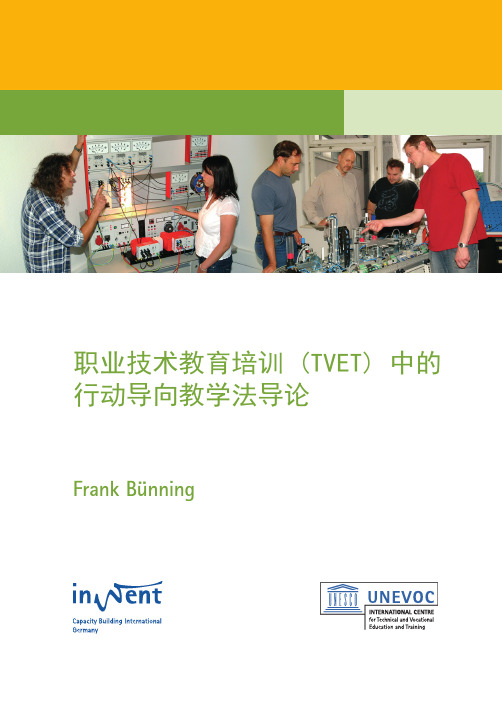
20
1.2.3 行动模型 A
22
1.2.4 行动模型 B
25
1.2.5 模型 A 与模型 B 的比较
27
1.3 艾伯利(Aebli)的行动模型
27
1.3.1 活动、行动和行为
ቤተ መጻሕፍቲ ባይዱ
27
1.3.2 行动的发展、行动的内化与行动教学的结构
30
1.3.3 行动和表述
33
2 行动导向教学的要领
35
3 动机和行动导向教学
Harry Stolte
Rupert Maclean
InWEnt, 部门4.02 UNESCO-UNEVOC
马格德堡 波恩
德国 德国
未来员工将面对全新的挑战,职业教育也会被重新定义;职业学校有义 务使得职业教育更具灵活性,以此来应对工作和社会环境的变化(德国各州 文教部长联席会议,2000,p.8)。威尔斯多夫(Wilsdorf)认为,在这种情况下 不仅应该注重学习的内容,而且更要强调学习的方法(Wilsdorf 1991,p.82)。
Fon +49 228 4460–0 Fax +49 228 4460–1766
ISBN: 978-3-939394-19-8 4.02-0003-2007
Dezember 2007
职业技术教育培训 (TVET) 中的行动导向教学 法导论 -心理学原理及相关教学理念 Approaches to Action Learning in Technical and Vocational Education and Training (TVET) – Review of Psychological Foundations and Selected Teaching Concepts of Action Learning
行动导向教学法在汽车电气构造与维修课程中的应用

行动导向教学法在汽车电气构造与维修课程中的应用
行动导向教学法(Action-Oriented Teaching)是一种以学生为中心,以实际操作为主导的教学方法。
该方法注重学生的实际动手能力和思考能力的培养,通过让学生参与实际操作和问题解决,提高学习效果和学习动力。
在汽车电气构造与维修课程中,行动导向教学法可以被广泛应用。
行动导向教学法能够培养学生的实际操作能力。
在汽车电气构造与维修课程中,学生需要学习和掌握各种电器元件的连接和安装方法,以及故障排除和维修技巧。
通过行动导向教学法,教师可以设计各种实际操作的情境,引导学生亲自操作电器元件,并通过实际操作体验和问题解决,加深学生对电气构造和维修知识的理解和掌握。
行动导向教学法能够增强学生的学习动力。
在传统的教学模式中,学生往往是被动接受知识的,容易产生学习的厌倦和无兴趣。
而通过行动导向教学法,学生可以以主动参与的方式进行学习,能够更加兴奋和积极地投入到学习中。
学生在实际操作中能够获得成就感和满足感,从而提高学习动力和学习效果。
行动导向教学法在汽车电气构造与维修课程中的应用可以有效地培养学生的实际操作能力和思考能力,增强学生的学习动力。
汽车电气构造与维修课程是一门实践性很强的课程,通过行动导向教学法的应用,可以更好地满足学生的学习需求和培养学生的综合素质。
让课堂充满活力——浅谈行动导向教学法在中职英语教学中的运用

2012-04新视角一、中职英语教学现状分析1.近几年对中职生的中考成绩的摸底调查结果表明:英语是中职学生最薄弱的科目。
他们普遍存在的问题是:学习不勤勉,学习动机不强烈,没有良好的学习习惯,缺乏正确的学习方法。
2.中等职业学校英语教学中一贯采用“教师讲,学生听;教师问,学生答”单一刻板的教学方式。
缺乏口语实践的机会,因此,学生的语言交际能力得不到提高。
职业学校英语教学不同于中学或大学,它有本身固有的职业特色。
例如旅游专业学生毕业后将从事酒店服务工作或导游工作。
它所倡导的是通过创设和营造真实有意义的语言环境,以活动为核心来组织教学。
这是完成中职学校英语教学任务最好的课堂组织形式,并能实现课堂教学向岗位体验延伸。
二、行动导向教学法的理论基础行动导向教学法是20世纪80年代以来,世界职业教学理论中出现的一种新的思潮。
行动导向教学法是以能力为本位的教学思想,由一系列教学技术所组成。
这种方法对于培养人的全面素质和综合能力起着十分重要的作用,所以受到世界职业教育界和劳动界的专家推崇。
行动导向教学法主要有:小组合作教学法、角色扮演法、任务教学法、案例教学法、头脑风暴教学法等等。
它的特点是,学生互相合作解决实际问题,学生参加全部教学过程,老师的作用发生了变化———从知识的传授者、教学过程的主要承担者变成一个咨询者或指导者。
三、行动导向教学法在英语教学中的应用行动导向教学法主要有:小组合作教学法、角色扮演法、案例教学法、头脑风暴教学法等等。
下面以浙江省中等职业学校英语课本第一册Unit6课文Mobile phone为例,谈谈行动导向教学法在中职英语教学中的具体运用。
“头脑风暴法”是英语教学中经常采用的一种教学方式,它能在最短时间内最大限度地调动学生进行各方面思考,获取最多的信息。
在上Mobile phones时,warm-up我就采用头脑风暴教学法,问学生:What do you usually do with a mobile phone?学生就会说出很多相关的词汇,如:make phone calls,send messages,play games...在采取头脑风暴时,教师尽可能鼓励更多的学生发表自己的想法,引导和鼓励学生想出更多更新的观点、看法。
行动导向教学模式在中职课程教学中的实践

行动导向教学模式在中职课程教学中的实践行动导向教学模式(Action-Oriented Teaching Mode,AOTM)是指以学习者为中心,强调学生自主学习、实践与行动的教学模式。
在中职课程教学中,行动导向教学模式的实践可以使学生更加积极主动地参与学习,培养学生的实践能力和动手能力,提高学生的综合素质。
本文将以中职课程教学实践为背景,探讨行动导向教学模式的实践策略和教学效果。
一、行动导向教学模式的理论基础行动导向教学模式是基于教育实践理论、认知学习理论和建构主义学习理论的教学模式。
教育实践理论强调学习者通过参与实践活动,建立新的知识和技能。
认知学习理论认为学习是一个主动的、建构性的过程,学习者通过实践和反思,建构自己的知识体系。
建构主义学习理论认为学生通过参与实践和交流,建构新的知识和理解。
行动导向教学模式倡导学生通过实践活动,获取知识和技能,强调学生参与和合作的学习过程,关注学生的认知和情感体验。
行动导向教学模式的实践策略包括问题导向、项目学习、合作学习、实践探究和反思总结等。
1. 问题导向:在中职课程教学中,可以引入问题导向的教学策略,以激发学生学习的兴趣和动力。
教师可以提出具体的实际问题,让学生通过实践活动和实地调研,探究问题的解决方案。
化学课程可以提出环境污染问题,让学生通过实验和调查研究,探讨环境污染的成因和防治措施。
2. 项目学习:项目学习是行动导向教学模式的重要策略之一。
教师可以设计具有挑战性和实践意义的项目任务,让学生在实践中获取知识和技能。
机械课程可以组织学生设计和制作简单机械装置,培养学生的动手能力和创新意识。
3. 合作学习:合作学习是行动导向教学模式的核心要素之一。
教师可以组织学生进行小组合作学习,让学生在合作中相互交流、共同探讨问题,实现知识的共建和共享。
电子商务课程可以组织学生合作开展一项实际的网络销售活动,培养学生的团队合作能力和创业意识。
4. 实践探究:行动导向教学模式倡导学生通过实践活动,探究问题,获取知识和技能。
《行动导向教学法理论基础》中英文翻译

行动导向教学法理论基础中英文翻译The theoretical basis for action-oriented teachingAction-oriented learning theory,which combines the cognitive learning process together with the jobaction,is oriented by action. Action-oriented teaching should be based on a corresponding basis of the theoretical framework.Basis1:Learning motivation theory of psychology.Psychological research on learning theory show that a person's learning pathways is including auditory,visual,audiovisual and do-it-yourself,or practices. The tests showed that contribution of different kinds of learning channel to the effect of learning is:20%of hearing,30%of vision,50%of hearing and vision,and90%of their own hands.Thus,through the practice of hand and brain,learning was more effective.The do-it-yourself,or students participating in the process of teaching and learning is an effective way of learning.On the other hand,each individual's learning, classroom interaction and practice of occasions,the motivation of students,all directly and closely related to the following factors,such as the learning environment and creating an atmosphere,the structure of teaching content and nature of its application,the application of knowledge or skills.Learning motivation is the starting point of action,which plays a very important role in learning.Teachers can use task to stimulate students’cognitive motivation and enhance students’confidence to complete tasks.Therefore,as a teacher,if we can properly mobilized these factors that affect student learning,take good use of the relationship between each factor, the learning objection will be achieved,so that each student's learning attitude, interests,motivations and needs will be changed as follow,and thus they will acquire knowledge,master skills,develop their capabilities.Action-oriented teaching psychology is built on the basis of the above,emphasizing the play to students' motivation and teachers the incentive to create a learning environment or a particular learning environment for each student to build a display personality,ability to play the the stage.Basis2:The concept of competency-basedThe core intent of action-oriented teaching theory is to make students’comprehensive ability.Action-oriented teaching foster students’social interaction ability in the group activities,foster their expression ability in demonstrating their technology training,and foster their social skills in the comptehensive practical activities.Students make their own work plans and put forward ideas to solve practical problems and activities,which results in the formation of the workingmethods and problem-solving methods.Action-oriented teaching raised students’independence,self-confidence,self-esteem and sense of responsibility for the work.Basis3:The humanistic point of viewEducation is aimed to develop human potential ability,so teachers should establish the concept of individualized education and a student-centered point of view. Every student should be viewed as a human beings with a unique feeling,rather than as objects to give something hard to impart knowledge.Therefore,teachers should make every student feel:"I have the right to choose to be an individual,I am a free individual,I have the right to set up my life goals."Humanist educational thinking emphasizes the cultivation of human creativity is an emphasis on self-centered, emphasizing"self-realization"theory of education.It believes that the ultimate goal of education is not to teach what is already,but to induce people to create power out of life to a sense of esteem and other personal spiritual"wake up"and make education truly has meaning up to the primitive,which is education cational goals Humanists pursue is not to be a knowledgeable person,but an independent judge, who has a unique personality.Thus,the humanistic educational philosophy of education is to learn how to learn.Therefore,the teaching activities must be designed to reflect the respect the students'interests and hobbies,the requirements of students’self-respect,helping them select what to do and how to learn.Basis4:Cooperative learning theoryCooperative learning is a kind of group-interaction teaching strategies,in which students learn depend on each other,help each other,also focus on individual performance and the common goal.Cooperative learning is a student-teacher interaction,which explore the atmosphere to make students create positive thinking, so that they can quickly acquire knowledge and skills.In the process of cooperation, students need to master the knowledge and skills to their own system based on their old knowledge,and then discuss with others through purposefully thought,and finally gain the new knowledge and skills.In the group,the different points of view generated by conflict and confrontation can help team members to re-construction of knowledge and skills system.Basis5:Constructivist learning theoryConstructivist learning theory emphasizes the importance of experience of the learner in knowledge construction.It also emphasizes that learning environment should be similar with the real situation occurs.Constructivist learning,which raised in1990s of United States,has a new interpretation on learning.Constructivism emphasizes that learning process is actively constructing knowledge rather thanpassive accepting external stimulation.Students construct new knowledge based on their existing knowledge and experience,at the same time adjust and change old knowledge frame.So the learning process is not new information on the direct absorption and accumulation,but the interaction between old and new knowledge. Constructivist theory of teaching requires teachers change their roles from knowledge transmitters to helpers of knowledge construction,which requires teachers in the teaching process should adopt a new educational philosophy and teaching methods and new teaching design.Constructivist learning theory emphasizes that knowledge is not taught by teachers,learners gain knowledge by the help of necessary learning materials in certain contextsbut learners in certain contexts that social and cultural context,with other people (including teachers and learning partners)to help with the necessary learning materials.Many teaching models have been successful in practice.Action-oriented teaching is to meet the development requirements of the proposed idea of a modern vocational education.It is proposed to develop the theory of teaching to practical teaching from traditional teaching model,also from concept teaching to application teaching.It can be seen as the main process of sustainable development,that is in the process,students can applicate their knowledge and ability into practice行动导向教学的理论基础行动导向学习理论将认知学习过程与职业行动结合在一起,行动是行动导向的核心,行动导向的教学应建立在一个相应的理论框架的基础之上。
行动导向教学法在英语教学中的运用

行动导向教学法在英语教学中的运用
行动导向教学法(Action-oriented approach)是一种以行动为中心的语言教学法,旨在培养学生在各种真实情境中运用外语进行交际的能力。
该教学法强调学生的实际应用能力,提倡学生的主动参与和互动合作,帮助他们在有意义的学习情境中探索学习和运用英语的过程。
一、强调语言技能的整体性
行动导向教学法要求学生将听、说、读、写四个语言技能进行整合,从而使学生能够在语言应用中更好地实现听、说、读、写的无缝连接,使“学以致用”成为可能。
在英语教学过程中,通过真实情境设定、角色扮演、小组合作等形式,引导学生在语言互动中实现语言技能的综合应用。
例如,通过设定一个购物场景,学生需要进行听取商品介绍、询问价格、描述商品、结账等多种语言交际过程,从而帮助学生全面提高使用外语进行交际的实际能力。
二、重视个性化需求
行动导向教学法注重学习者的个性化需求和兴趣爱好,将学习置于学生的个人意义和应用领域中。
因此,在英语教学中,可以让学生选择自己感兴趣的话题或场景,例如喜欢旅游的学生可以选择关于旅游的话题,喜欢运动的学生可以选择关于体育运动的话题,从而激发他们的学习兴趣和主动性。
通过学生的个性化选择,使学习更具针对性和灵活性。
三、侧重学习过程
行动导向教学法更注重学习过程的体验和效果。
在英语教学中,教师可以通过多种方式促进学生的参与和互动,例如小组合作、问题解决等。
同时,还可以通过学生的自我评价和同伴评价等方式加强学习者的自我反思和提高学习质量。
通过这些实际的操作,使学生在活动中体验到学习过程的快乐和成就感,增加学习动机和自信心。
四、鼓励交际能力。
行动导向教学法打造活力中职英语教学
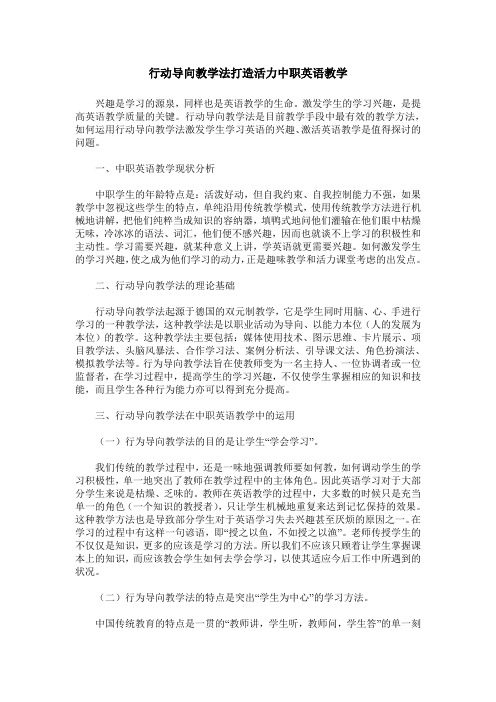
行动导向教学法打造活力中职英语教学兴趣是学习的源泉,同样也是英语教学的生命。
激发学生的学习兴趣,是提高英语教学质量的关键。
行动导向教学法是目前教学手段中最有效的教学方法,如何运用行动导向教学法激发学生学习英语的兴趣、激活英语教学是值得探讨的问題。
一、中职英语教学现状分析中职学生的年龄特点是:活泼好动,但自我约束、自我控制能力不强,如果教学中忽视这些学生的特点,单纯沿用传统教学模式,使用传统教学方法进行机械地讲解,把他们纯粹当成知识的容纳器,填鸭式地问他们灌输在他们眼中枯燥无味,冷冰冰的语法、词汇,他们便不感兴趣,因而也就谈不上学习的积极性和主动性。
学习需要兴趣,就某种意义上讲,学英语就更需要兴趣。
如何激发学生的学习兴趣,使之成为他们学习的动力,正是趣味教学和活力课堂考虑的出发点。
二、行动导向教学法的理论基础行动导向教学法起源于德国的双元制教学,它是学生同时用脑、心、手进行学习的一种教学法,这种教学法是以职业活动为导向、以能力本位(人的发展为本位)的教学。
这种教学法主要包括:媒体使用技术、图示思维、卡片展示、项目教学法、头脑风暴法、合作学习法、案例分析法、引导课文法、角色扮演法、模拟教学法等。
行为导向教学法旨在使教师变为一名主持人、一位协调者或一位监督者,在学习过程中,提高学生的学习兴趣,不仅使学生掌握相应的知识和技能,而且学生各种行为能力亦可以得到充分提高。
三、行动导向教学法在中职英语教学中的运用(一)行为导向教学法的目的是让学生“学会学习”。
我们传统的教学过程中,还是一味地强调教师要如何教,如何调动学生的学习积极性,单一地突出了教师在教学过程中的主体角色。
因此英语学习对于大部分学生来说是枯燥、乏味的。
教师在英语教学的过程中,大多数的时候只是充当单一的角色(一个知识的教授者),只让学生机械地重复来达到记忆保持的效果。
这种教学方法也是导致部分学生对于英语学习失去兴趣甚至厌烦的原因之一。
在学习的过程中有这样一句谚语,即“授之以鱼,不如授之以渔”。
行动导向教学法
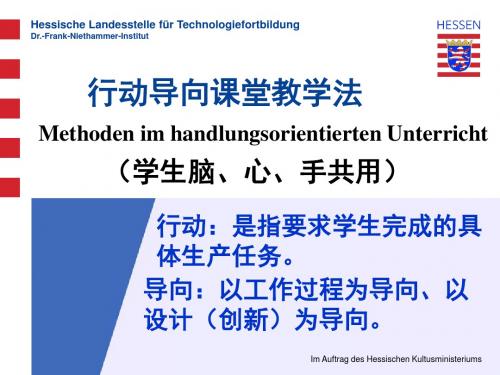
Hessische Landesstelle für Technologiefortbildung
2、元规划ห้องสมุดไป่ตู้学法
又称作卡片式教学法。
1.目的:收集各种观点、意见 2.所有组员积极参与: 3.程序:提出问题、问卷调查、发表观点(卡片)、展示、 观点分类、朗读卡片内容、将卡片分类、增加标题、补充评 论、评价等。
我国职业学校班级学生人数较多,通常在 30人以上,以教师为中心,围绕教材学习,课 堂秩序安静,在老师的掌控下,听我教,跟我 学,传授学生系统地专业理论和专业能力。体 现的是“你要学”。
行动导向教学中常用的教学模式
1、项目教学法
(以学生为中心,注重的是完成项目的过程的教学方法)
任务要素:任务的完整性
(1)明确项目任务 教师提出 同学讨论 (2)制定计划 学生制定 教师认可 (3)实施计划 确定分工 合作完成 (4)检查评估 自我评估 教师评价 (5)归档或应用 记录归档 应用实践
组织要素:小组或全班合作学习 评价要素:学习成果的多样化
Im Auftrag des Hessischen Kultusministeriums
Hessische Landesstelle für Technologiefortbildung
双元制教学(1900年、职业教育的核心、 是德国崛起的秘密武器)
职业学校(教师) 学生制(理论教学大纲) 理论知识(解决为什么这么做 的问题)
3. 决定(筛选、最佳) 5. 检验(对以 上所有工作)
4. 执行(实际操作)
教师花大量的时间进行备课。
Hessische Landesstelle für Technologiefortbildung
行动导向教学法的特点: 注重行动能力的培养
行动导向教学法在高校有机化学实验中的应用
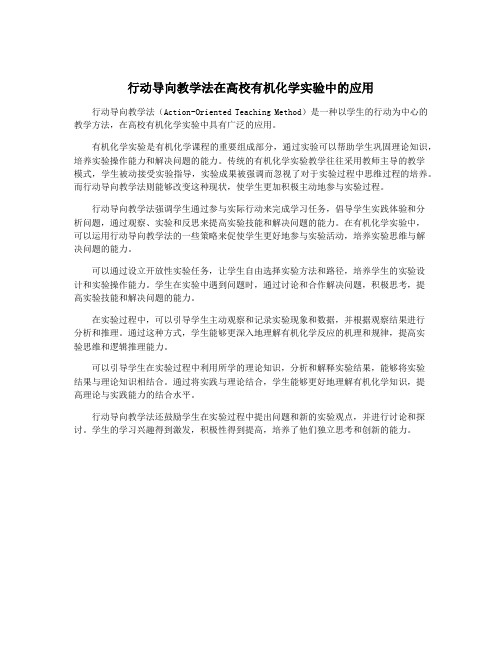
行动导向教学法在高校有机化学实验中的应用行动导向教学法(Action-Oriented Teaching Method)是一种以学生的行动为中心的教学方法,在高校有机化学实验中具有广泛的应用。
有机化学实验是有机化学课程的重要组成部分,通过实验可以帮助学生巩固理论知识,培养实验操作能力和解决问题的能力。
传统的有机化学实验教学往往采用教师主导的教学模式,学生被动接受实验指导,实验成果被强调而忽视了对于实验过程中思维过程的培养。
而行动导向教学法则能够改变这种现状,使学生更加积极主动地参与实验过程。
行动导向教学法强调学生通过参与实际行动来完成学习任务,倡导学生实践体验和分析问题,通过观察、实验和反思来提高实验技能和解决问题的能力。
在有机化学实验中,可以运用行动导向教学法的一些策略来促使学生更好地参与实验活动,培养实验思维与解决问题的能力。
可以通过设立开放性实验任务,让学生自由选择实验方法和路径,培养学生的实验设计和实验操作能力。
学生在实验中遇到问题时,通过讨论和合作解决问题,积极思考,提高实验技能和解决问题的能力。
在实验过程中,可以引导学生主动观察和记录实验现象和数据,并根据观察结果进行分析和推理。
通过这种方式,学生能够更深入地理解有机化学反应的机理和规律,提高实验思维和逻辑推理能力。
可以引导学生在实验过程中利用所学的理论知识,分析和解释实验结果,能够将实验结果与理论知识相结合。
通过将实践与理论结合,学生能够更好地理解有机化学知识,提高理论与实践能力的结合水平。
行动导向教学法还鼓励学生在实验过程中提出问题和新的实验观点,并进行讨论和探讨。
学生的学习兴趣得到激发,积极性得到提高,培养了他们独立思考和创新的能力。
行动导向教学法在儿科护理教学中的运用分析

行动导向教学法在儿科护理教学中的运用分析行动导向教学法(Action-oriented teaching method)是一种以学生为中心,以学生的实际行动为基础进行教学的方法。
在儿科护理教学中,行动导向教学法能够有效地提高学生的实践能力和问题解决能力,使他们在真实的临床环境中培养和提升儿科护理技能。
本文将从行动导向教学法的基本原理、特点和在儿科护理教学中的运用进行详细分析,以期为儿科护理教学提供一种有效的教学方法。
行动导向教学法是以学生的问题为起点,通过学生的实际行动和反思来达到教学目标的一种教学方法。
其基本原理在于通过学生的自主学习和实践,帮助学生建立起知识与实践的联系,提高他们的实践能力和问题解决能力。
行动导向教学法的特点主要包括以下几个方面:行动导向教学法注重学生的参与和主动性。
学生不再是被动接受知识的对象,而是通过自主学习和实践来掌握知识和技能。
教师不再是知识传授者,而是学生学习的引导者和辅助者。
行动导向教学法强调学生的实践和反思。
通过实际行动,学生能够更加深入地理解和应用所学知识,通过反思,学生能够主动发现自己行动中存在的问题和不足之处,并且能够针对这些问题和不足进行调整和改进。
行动导向教学法注重学生的合作与交流。
在学生的实际行动中,他们需要和其他学生进行合作,通过交流和互动来达到共同的学习目标。
这种合作和交流能够促进学生的思维发展和能力提升。
行动导向教学法注重问题的解决和应用。
学生在实际行动中,会遇到各种问题和挑战,他们需要通过运用所学知识和技能来解决这些问题和挑战。
这种能力的培养能够使学生更好地应对真实的临床环境,提高他们的工作能力和素质。
教师可以设计一些明确的实践任务和情境,让学生在实际行动中运用所学知识和技能。
教师可以组织学生到儿科病房观察和实践,让他们通过实际操作来掌握儿科护理技能。
教师可以培养学生的问题解决能力和创新能力。
在学生实际行动的过程中,教师可以引导他们发现并解决实际问题,激发他们的创造力和创新精神。
- 1、下载文档前请自行甄别文档内容的完整性,平台不提供额外的编辑、内容补充、找答案等附加服务。
- 2、"仅部分预览"的文档,不可在线预览部分如存在完整性等问题,可反馈申请退款(可完整预览的文档不适用该条件!)。
- 3、如文档侵犯您的权益,请联系客服反馈,我们会尽快为您处理(人工客服工作时间:9:00-18:30)。
行动导向教学法理论基础中英文翻译The theoretical basis for action-oriented teachingAction-oriented learning theory,which combines the cognitive learning process together with the jobaction,is oriented by action. Action-oriented teaching should be based on a corresponding basis of the theoretical framework.Basis1:Learning motivation theory of psychology.Psychological research on learning theory show that a person's learning pathways is including auditory,visual,audiovisual and do-it-yourself,or practices. The tests showed that contribution of different kinds of learning channel to the effect of learning is:20%of hearing,30%of vision,50%of hearing and vision,and90%of their own hands.Thus,through the practice of hand and brain,learning was more effective.The do-it-yourself,or students participating in the process of teaching and learning is an effective way of learning.On the other hand,each individual's learning, classroom interaction and practice of occasions,the motivation of students,all directly and closely related to the following factors,such as the learning environment and creating an atmosphere,the structure of teaching content and nature of its application,the application of knowledge or skills.Learning motivation is the starting point of action,which plays a very important role in learning.Teachers can use task to stimulate students’cognitive motivation and enhance students’confidence to complete tasks.Therefore,as a teacher,if we can properly mobilized these factors that affect student learning,take good use of the relationship between each factor, the learning objection will be achieved,so that each student's learning attitude, interests,motivations and needs will be changed as follow,and thus they will acquire knowledge,master skills,develop their capabilities.Action-oriented teaching psychology is built on the basis of the above,emphasizing the play to students' motivation and teachers the incentive to create a learning environment or a particular learning environment for each student to build a display personality,ability to play the the stage.Basis2:The concept of competency-basedThe core intent of action-oriented teaching theory is to make students’comprehensive ability.Action-oriented teaching foster students’social interaction ability in the group activities,foster their expression ability in demonstrating their technology training,and foster their social skills in the comptehensive practical activities.Students make their own work plans and put forward ideas to solve practical problems and activities,which results in the formation of the workingmethods and problem-solving methods.Action-oriented teaching raised students’independence,self-confidence,self-esteem and sense of responsibility for the work.Basis3:The humanistic point of viewEducation is aimed to develop human potential ability,so teachers should establish the concept of individualized education and a student-centered point of view. Every student should be viewed as a human beings with a unique feeling,rather than as objects to give something hard to impart knowledge.Therefore,teachers should make every student feel:"I have the right to choose to be an individual,I am a free individual,I have the right to set up my life goals."Humanist educational thinking emphasizes the cultivation of human creativity is an emphasis on self-centered, emphasizing"self-realization"theory of education.It believes that the ultimate goal of education is not to teach what is already,but to induce people to create power out of life to a sense of esteem and other personal spiritual"wake up"and make education truly has meaning up to the primitive,which is education cational goals Humanists pursue is not to be a knowledgeable person,but an independent judge, who has a unique personality.Thus,the humanistic educational philosophy of education is to learn how to learn.Therefore,the teaching activities must be designed to reflect the respect the students'interests and hobbies,the requirements of students’self-respect,helping them select what to do and how to learn.Basis4:Cooperative learning theoryCooperative learning is a kind of group-interaction teaching strategies,in which students learn depend on each other,help each other,also focus on individual performance and the common goal.Cooperative learning is a student-teacher interaction,which explore the atmosphere to make students create positive thinking, so that they can quickly acquire knowledge and skills.In the process of cooperation, students need to master the knowledge and skills to their own system based on their old knowledge,and then discuss with others through purposefully thought,and finally gain the new knowledge and skills.In the group,the different points of view generated by conflict and confrontation can help team members to re-construction of knowledge and skills system.Basis5:Constructivist learning theoryConstructivist learning theory emphasizes the importance of experience of the learner in knowledge construction.It also emphasizes that learning environment should be similar with the real situation occurs.Constructivist learning,which raised in1990s of United States,has a new interpretation on learning.Constructivism emphasizes that learning process is actively constructing knowledge rather thanpassive accepting external stimulation.Students construct new knowledge based on their existing knowledge and experience,at the same time adjust and change old knowledge frame.So the learning process is not new information on the direct absorption and accumulation,but the interaction between old and new knowledge. Constructivist theory of teaching requires teachers change their roles from knowledge transmitters to helpers of knowledge construction,which requires teachers in the teaching process should adopt a new educational philosophy and teaching methods and new teaching design.Constructivist learning theory emphasizes that knowledge is not taught by teachers,learners gain knowledge by the help of necessary learning materials in certain contextsbut learners in certain contexts that social and cultural context,with other people (including teachers and learning partners)to help with the necessary learning materials.Many teaching models have been successful in practice.Action-oriented teaching is to meet the development requirements of the proposed idea of a modern vocational education.It is proposed to develop the theory of teaching to practical teaching from traditional teaching model,also from concept teaching to application teaching.It can be seen as the main process of sustainable development,that is in the process,students can applicate their knowledge and ability into practice行动导向教学的理论基础行动导向学习理论将认知学习过程与职业行动结合在一起,行动是行动导向的核心,行动导向的教学应建立在一个相应的理论框架的基础之上。
